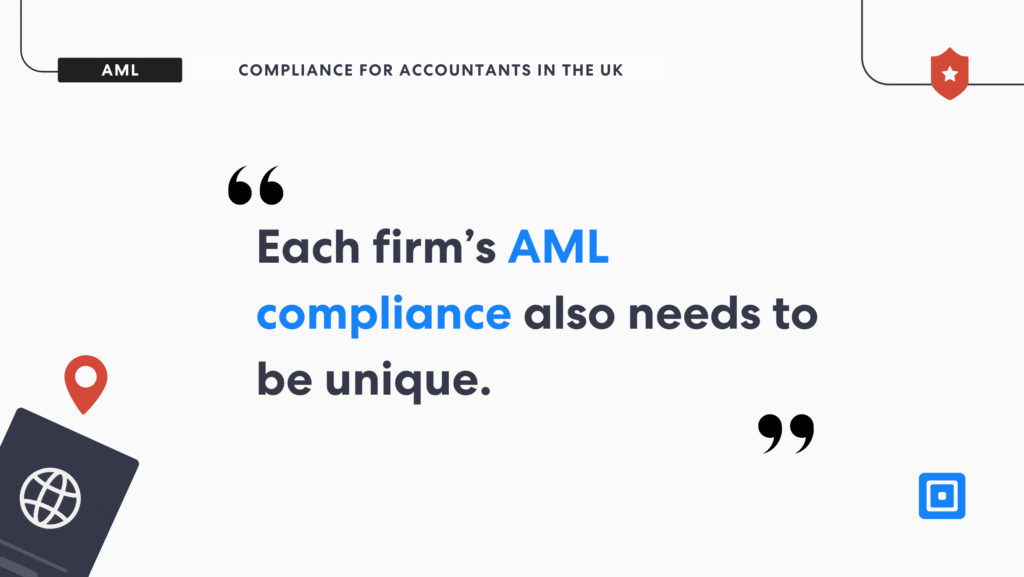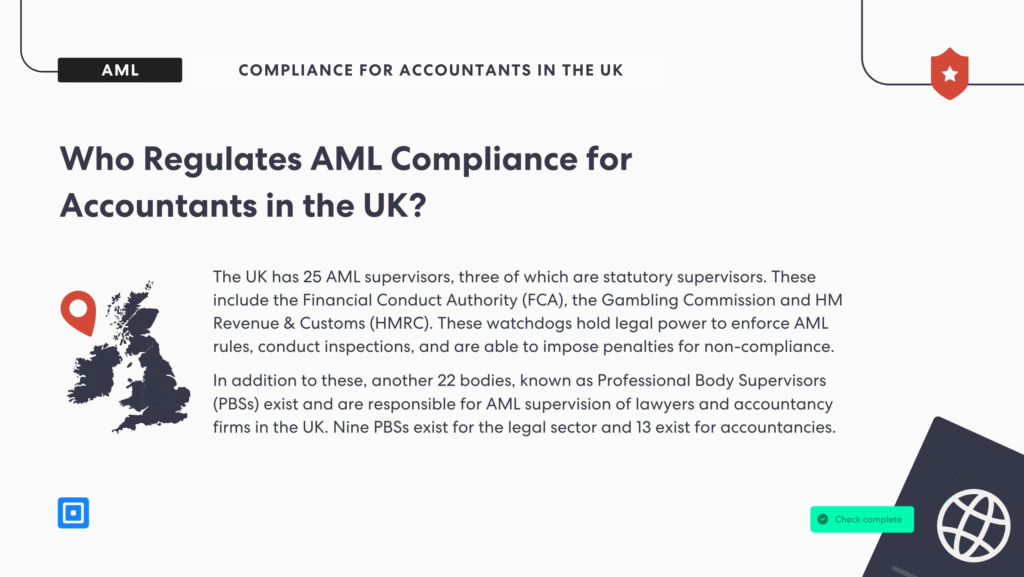Compliance risks are a very real threat for all accountancy firms, as a lack of stringent AML protocols can put them at risk large fines due to non-compliance. Advanced AML in accounting fortifies accountancy firms with risk-based approach to onboarding new clients, minimising fraud risks and ensuring full AML compliance.
To mitigate these risks, advanced AML checks are essential. They offer accountancy firms a structured, risk-based approach to onboarding new clients and maintaining ongoing due diligence. By using intelligent screening tools, and real-time monitoring, firms can better assess the risk level of each client, detect red flags early, and ensure that suspicious transactions are reported appropriately. This proactive stance not only enhances regulatory compliance but also safeguards the integrity of the firm’s operations.
UK Anti Money Laundering Compliance Standards
Accountancy firms in the UK must comply with stringent regulations regulations, such as the Money Laundering, Terrorist Financing, and Transfer of Funds (Information on the Payer) Regulations 2017 (MLRs), which were amended in 2019. This applies to all accountants who provide services such as bookkeeping, payroll, accounting, tax compliance, as well as company formation. These regulations require identity verification, risk profiling, suspicious activity reporting, customer due diligence, ongoing monitoring, and more. If firms fail to comply, it can result in penalties, damage to their reputation, and possible criminal prosecution.

David Winch, the AML & Onboarding Adviser at MLRO Support Ltd, states, “Each accountancy firm is unique – not least because the partners in it have a unique experience, knowledge, and interests,” said Winch. “In my opinion, each firm’s AML compliance also needs to be unique.” For more on UK AML regulation, read “Achieving Compliance: UK AML Regulation.”
Regulatory Bodies and Financial Accounting Standards
Several regulatory bodies monitor and supervise accounting firms in terms of AML compliance, monitoring customer relationships, financial information, and industry practices overall. Some of main regulators for AML compliance in accounting firms in the UK include:
Financial Conduct Authority (FCA)
The FCA established OPBAS in 2018, a body which supervises 25 professional body supervisors (PBSs) across both law and accountancy firms. It’s key objectives consist of ensuring a high standard of supervision and to share information between PBSs, statutory supervisors and law enforcement agencies.
The FCA is committed to playing a leading role in reducing and preventing financial crime. Through OPBAS, we have intervened to tackle failings where we have found them.
OPBAS assesses PBSs against the Money Laundering Regulations 2017, identifying areas for improvement and intervening when necessary. For instance, in 2024, OPBAS directed two PBSs to take corrective action due to identified shortcomings.
We are still not seeing the consistent, effective improvement we need.
Andrea Bowe, Director at the FCA, states, “The FCA is committed to playing a leading role in reducing and preventing financial crime. Through OPBAS, we have intervened to tackle failings where we have found them. However, we are still not seeing the consistent, effective improvement we need.”
Despite progress, OPBAS has identified several areas where PBSs need to enhance their effectiveness:
Enforcement Actions: The number and value of fines issued to non-compliant firms have declined, indicating a need for more assertive enforcement.
Information Sharing: Proactive sharing of intelligence with regulators and law enforcement remains inconsistent, hindering coordinated efforts to combat financial crime.
Risk-Based Supervision: Some PBSs have been slow to implement and update risk profiles, affecting the prioritisation of supervisory activities.
In response, OPBAS continues to utilise its regulatory tools to hold PBSs accountable and drive improvements in supervision.
HM Revenue & Customs (HMRC)
HM Revenue & Customs (HMRC) supervises the anti-money laundering (AML) compliance of accountancy firms in the UK that are not already overseen by professional body supervisors, such as ICAEW or ACCA. Any accountancy service provider (ASP) offering services like tax advice, bookkeeping, or auditing, and not under a professional body’s AML supervision, must register directly with HMRC. This registration is not a one-time event—it involves an annual supervision fee and a requirement to keep HMRC informed of any significant changes to the business. Failure to register or renew properly can result in a firm being prohibited from legally offering AML-regulated services.
If HMRC identifies weaknesses or non-compliance during a review, it has the power to take enforcement action. This can include issuing written warnings, imposing civil penalties, or removing a firm from the AML register altogether.

Professional Bodies such as the ICAEW and the AAT
The Institute of Chartered aCcountants in England and Wales (ICAEW) and the Association of Accounting Technicians (AAT) ensure that their supervised firms comply with legal obligations through a structured framework of oversight, guidance, and enforcement. These bodies conduct periodic supervisory reviews, which may involve desk-based assessments or on-site visits, to check that member firms are meeting these expectations. During these reviews, they assess whether firms are adequately identifying and managing money laundering risks, keeping proper records, training staff effectively, and reporting suspicious activities when required.
AML in Accounting Best Practices
AML in accounting has become a critical component of ensuring the integrity of financial reporting and protecting the global financial system from money laundering, terrorist financing, and organized crime. Accounting firms are now expected to integrate anti-money laundering (AML) protocols that align with industry-specific regulations and compliance standards to combat financial crime and meet the expectations of regulators such as the Securities and Exchange Commission (SEC) and the Financial Action Task Force (FATF).
These efforts include identifying beneficial owners, reporting suspicious transactions, and maintaining accurate records in accordance with the Bank Secrecy Act and other regulations which together aim to improve corporate responsibility, prevent corporate fraud, and ensure enhanced financial disclosure. Adequate AML and KYC checks, including Adverse Media Checks, Identity Verification with Liveness Detection, PEP Screening, Document Checks, and more, should be implemented by all accountancy firms.
Accounting firms need to protect themselves from the risk of both fraud and non compliance.
Harry Varatharasan, Chief Product Officer at ComplyCube, states, “Accounting firms need to protect themselves from the risk of both fraud and non compliance. By implementing robust AML procedures and advanced verification systems, firms not only safeguard their operations but also build trust with clients and regulators, ensuring long-term success in an increasingly regulated financial landscape.”
Accounting compliance refers not only to adhering to generally accepted accounting principles (GAAP) such as the revenue recognition principle, economic entity assumption, and concern principle, but also to implementing strong internal controls, independent audit committees, and internal audit procedures to ensure the accuracy of financial statements, balance sheets, and annual reports. These measures are crucial for both public companies and private companies, especially as compliance risks and data breaches grow in an increasingly unregulated market.
For more information on how you can safeguard your business with ComplyCube’s AML checks, get in touch with one of our compliance experts.




